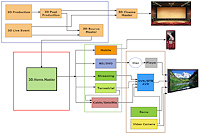The workshop on first generation 3D TV on 30 April 2009 organized by the EBU in conjunction with the SMPTE and the ITU brought to light much new information, but for many delegates also a realisation that moving to a single world standard for broadcasting 3D is not going to be simple.
| Many options
Though the basis for the system - left and right eye channels precisely synchronized - is clear, the next stages to the home and viewer are not. The two channels need to be conveyed in a broadcast channel. This might seem simple but there are many ways of doing it, and a wide range of different results about how each way performs. The broadcast format can be made compatible with normal broadcast channels in different ways, and it can be made compatible with normal viewing in different ways. Each involves a different trade off of quality. All the alternatives can 'work', but if we want to discern which is better, there seems to be much work to be done. A number of different systems have been developed by different manufacturers so industrial interests are involved too. | 3D end-to-end view (SMPTE) |
Who will determine which is better?
There is also a range of ways of displaying the 3D TV picture, which each need their own type of display. If there is to be a common standard it will take a lot of work to enable comparisons to be made between the alternative systems. In the past, groups of laboratories such those in the EBU would have taken on an unbiased test campaign. In these times of economic stringency, and with fewer broadcast technology laboratories in the world, this may be difficult.
BluRay working separately
As if this were not enough problems, the BluRay Association is working on its own 3D system separately. If the packaged media display system turns out to be different to the broadcast system, and the public is obliged to buy two different types of display, this will fragment the market and slow down 3D TV for everyone. Can the standards bodies lead the world to a common system? Time will tell, but it is going to be difficult...
For more information on 3D TV standardisation, please contact: David Wood (EBU).

